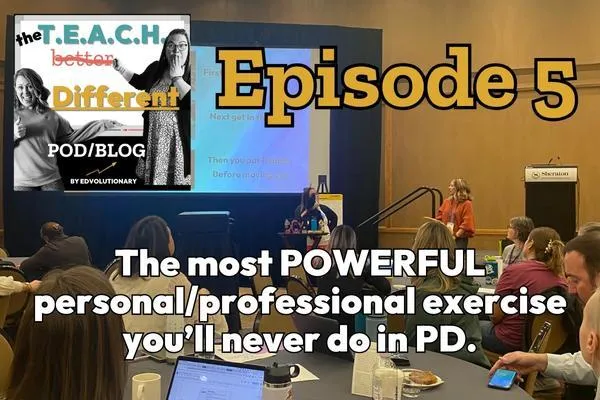T: Teacher Sustainability & Growth
THE TEACH DIFFERENT (NOT BETTER) POD/BLOG

5: The most POWERFUL personal/professional exercise you'll never do in PD.
Listen to the episode:
This week's post is brought to you by the letter T! Learn more about the TEACH Framework here.
Grab this week's companion workbook in the form at the bottom of this post under "Time for Action."
Get notified about our TEACH Different Community- opening in July!
Post/Episode Summary:
Hey.... it's Ali.
I have a pretty serious confession for you today on the podcast.
And then I have something for you to help you if you have a similar problem... or really any kind of problem.
This is the good stuff. Hope you enjoy.
Confession time
I have a pretty serious confession for you today.
I am a great math teacher.
That’s actually not the confession. But I have to start there.
I think I am a great math teacher because I have deeply studied and understand how children learn math, and I can observe almost any student, see where their understanding is breaking down, and know the kind of activity sequence I can pull to get them actually interested and engaged in math.
So here’s the real confession.
I’m not good at managing whole group math lessons.
Like not total suck where it feels toxic and people are unsafe. My relationships with kids guard against that.
But ebbs and flows of interruption that at times derail the lesson level suck.
Why is this happening in my 8th year of teaching I am mortified and ashamed and want no one to ever, ever see this level suck.
The “Hi I’m Ali and I’m the math lead at EDVOLUTIONARY and my whole class math management makes me worried you will think I’m a total imposter” level suck.
Why are you telling me this, Ali?!?
A year ago I could not have named that publicly on a blog that is available for anyone in the world with a wifi connection to know. I would have prayed every night before going to bed that no one would find out my shameful little secret.
If you are a fairly empathic person which I imagine many teachers are… you are probably wallowing in my shame right now. Don’t worry. I promise this story is going to get better.
Last week I talked about how the secret to unlocking our superpowers as a teacher starts with self-awareness and our inner voice or self… rather than who we think we have to be in order to safely belong in the cultural environments we find ourselves in. This may have been important to our cave-man ancestors who would not eat if seen as outside of the group, but that is not our reality now even though our reptilian brains feel the same level of pain they did back then when we color outside the lines.
Part of self-awareness is being honest about both the things we like and the things we often don’t like in ourselves.
Not as hard as you think
Before you get terrified of what I’m about to ask you to try today, listen to this excerpt from an interview with Vasavi Kumar, author of Say It Out Loud because I’ve never heard someone frame this scary, scary thing in a more freeing way (I'll try to transcribe this at some point but I'm writing this 3 days before having a baby... so here ya go):
Listen from 30:17- 32:17
I love this line:
It’s such a beautiful process of being real with where you’re at, not beating yourself up over it, getting clear and committed on the what the heck you actually do want… and then take the action.
Time to face the truth
And what happens if we don't do the work?
In the book The Four Pivots, Reimagining Justice, Reimagining Ourselves, Dr. Shawn Ginwright writes:
Over time, our inability to embrace or face the truth begins to wear down and blemish our integrity. So instead of being honest with ourselves, we suck it up, grind through and bullnose our way through life. I’m not saying perseverance is wrong, but the problem is that sometimes perseverance is the only tool we use, and therefore we never pick up new tools to deal with life’s problems.
Ugh… and you know if you listened to episode 3 that this kind of perseverance keeps us stuck.
I literally put my head down and persevered through the feelings of shame about my lacking math management forever because I didn’t want to face that messy truth about myself.
But here’s the thing. Once I was actually truthful there there was a problem there… I could solve it.
One thing you should also know is that at one time I did teach more than just math. And in the years I was also a reading teacher, my small group/independent reading time was really solid. Like low hum of energy at my small group table, everyone else engrossed in reading for the most part… we are dealing with volitile human beings after all.
And so I wondered…What was the difference? What skills did I have there that I didn’t have in this math context?
Turns out it went deeper than needing to learn or practice management skills. In reading time, I believed to my core that everyone deserved the a calm, quiet space to get fully into a book. And so it was really easy for me to uphold that as the norm.
But in math, I fundamentally did not believe that 2nd graders who ranged in math abilities from kindergarten level to 3rd grade level… should all have to sit on the rug for the same 15- 20 minute lesson as everyone else… do essentially the same but maybe slightly modified assignment as everyone else… and be held accountable to sitting quietly and calmly through their boredom or frustration when I myself have to walk out of a Zumba class and try not to roll my eyes when it isn’t meeting the level of energy I’m needing to expend. I couldn’t do to others what I would HATE someone doing to me.
That is a very different problem. Because you can’t force yourself to get better at doing something you inherently don’t believe in… and when you try to… it turns into a mess you feel like you have to hide from everyone. And then you live in a world of constant insecurity and you don’t end up solving your problem and end up burning out.
The real problem
So obviously I still had a problem. But the problem wasn’t that I was a bad manager even though i was. It was that kids needed to learn math and I never was going to want to BE a manager and so the toolbox I had wasn’t working for ME because of deeper cultural values and beliefs that were never going to be changed no matter how much someone might coach me. The body won’t let you lie to yourself… at least not all the way.
And so I set out to build a new toolbox. And that is how edvolutionary and my work with more student-directed learning began. I wanted a way to teach that could meet student needs while empowering them to manage and hold themselves accountable to their learning. And what Annie and I are creating out of what was once a problem I was ashamed to face is something I feel such pride and buzz of potential for now. Especially when I think about what it can mean for others who have the same struggle, or at least want the same opportunities for students that unlock their potential to manage their own learning rather than manage them into submission ourselves.
See… I told you my shameful story has a happy ending! And the best part is that it’s not over. It’s still being written which makes it even better.
In The Four Pivots, Dr. Ginwright writes:
Truth boils down to one thing: having clarity about our story and sharing it. Truth telling requires that we conjure up the courage to convey what is real for us, and when we do that, we are more authentic and powerful.
Amen.
4 steps to do this yourself
So what is the truth about yourself you’ve been avoiding?
Pick just one to start.
In the free companion guide you can request in the shownotes, I’ve created a graphic organizer to help you walk through this. I’ll quickly voice over it now:
Part 1: Name a truth or challenge you’ve been avoiding.
So for me: management during math time impeding student learning.
Part 2: is this a values issue?
For me- yes. I didn’t believe kids should have to sit on a rug to learn a lesson that didn’t meet their needs when there was potentially another way to do it.
Part 3: Is this a skills related issue?
Could I have worked on my management skills? In some ways maybe…. but not to the level it would have solved my problem because my beliefs would have been in the way and I probably would just continue to be frustrated an ineffective.
Part 4: Next steps:
What solution or support is going to help me solve my real problem? My real problem was that i needed an approach to teaching math where I felt I could meet student academic needs and respect them as humans like me who get annoyed when people try to force us to do things that don’t align with our needs and values (ever sat through a waste of time pd geared toward the lowest common denomiator? You know what i’m talking about). So next steps… find it or create it.
Time for Action:
Okay… so once you’ve done this activity for yourself, hold on to it. In future episodes we’ll build on this so you can go into next school year fully recharged in all your power.
If you are a school coach or leader… do the same… but also think about how you approach teacher development. Sometimes we we think teachers need skill support when there is actually a misalignment in values. What is your ultimate goal? Is it that whole group math management is on point or that students are happily engaged in math and learning? When we help people create solutions that align to their values we unlock their potential for more. This can also be a great way to think about school-wide initiatives that often fail because we ask people to perform certain actions without realizing they may be out of alignment witth their cultural values.
Download the companion workbook here!
Also…If you want to join a community further diving into these topics and others of our TEACH Framework, don’t forget to sign up to be notified when our TEACH Different Collective opens later this summer! To read about our initial vision, give your input and/or join the list to get notified when this community opens, go to edvolutionary.com/collective. You can also add your name to the notification list using the form below!
All links from this post/episode
Thank you for being on the journey with us as we build out this content!
What do we mean by TEACH Different (not better?)


